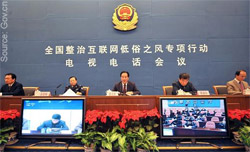

|
||
|
||
Seven different government agencies, including the Ministry of Public Security and the State Council Information Office declared war on Internet smut today. 19 Internet companies, including Google, Baidu, Sina, and others, were cited for “violating public morality and harming the physical and mental health of youth and young people.”
 The official government online announcement is here. Another Chinese language report, including video of a TV report with footage of computer servers being confiscated by police at an unknown location and unknown time is here.
The official government online announcement is here. Another Chinese language report, including video of a TV report with footage of computer servers being confiscated by police at an unknown location and unknown time is here.
The meeting was chaired by Vice Minister Cai Mingzhao of the State Council Information Office (the same guy who met a few months back with Wikipedia’s Jimmy Wales, and who has been emphasizing the need for strategic control of the Internet for the past few years in various speeches). According to Reuters:
“Some websites have exploited loopholes in laws and regulations,” said Cai Mingzhao, a deputy chief of the State Council Information Office, who chaired the meeting, according to a report on an official news website (www.china.com.cn).
“They have used all kinds of ways to distribute content that is low-class, crude and even vulgar, gravely damaging mores on the Internet.”
The Information Office is the government face of the Party’s propaganda and censorship machine.
Cai told officials to “fully grasp the gravity and threat of the vulgar current infesting the Internet” and said law-breakers face “stern punishment.”
Representatives of Google, Baidu, Sina, and others who journalists contacted as of this writing have so far had no meaningful comment.
It is of course unclear to what extent this anti-smut crackdown is or isn’t going to lead to a tightening on politically sensitive content as well. Historically in China (if you can call the story of China’s Internet “history”), the technology used to censor porn has ended up being used more vigorously to censor political content than smut. The Financial Times has a story today quoting He Zhaohui, marketing manager at TRS Information Technology, “China’s leading provider of search technology and text mining solutions.” According to the FT, He says TRS is “thriving on the government’s desire to better “manage” public opinion, comes as the political leadership is facing growing challenges, mostly voiced through the internet.”
The folks over at Danwei.org, who have been following Chinese media regulations for years, aren’t about to get their panties in a twist over loss of smut just yet. Alice Xin Liu writes: “This campaign is very similar to countless content cleansing campaigns over the past few years. It does not signify much except that the Net Nanny is making sure everyone knows who is boss before the Chinese New Year starts.” Jeremy Goldkorn points out that on the same day this campaign is announced, the People’s Daily website among others ran racy photos of Zhang Ziyi. Heck, it wasn’t long ago that Xinhua was known widely around the China expat web as “Skinhua”... How quickly people forget…
I heard from a couple of reporters today who asked if there’s been any other crackdown like this in the past. It seems that everybody has also forgotten the crackdown on video websites that took place last March, which caused the Chinese YouTube clone Tudou.com to go offline for 24 hours in order to upgrade its censorship and monitoring systems.
One reporter asked me whether this latest crackdown marks a new hard-line phase after the “relative freedom of 2008.” I pointed out that the unblocking of a number of prominent foreign websites around the Olympics was only one part of the picture for 2008. Chinese domestic websites hosting blogs, chatrooms, and other user-generated content never let up on political censorship. It’s just that foreigners only seem to notice what happens to foreign websites...
Sponsored byVerisign

Sponsored byDNIB.com

Sponsored byVerisign

Sponsored byWhoisXML API

Sponsored byRadix

Sponsored byCSC

Sponsored byIPv4.Global
